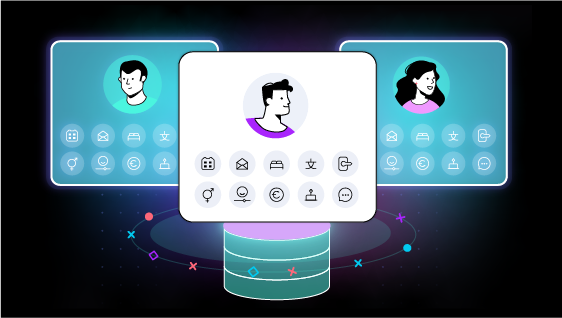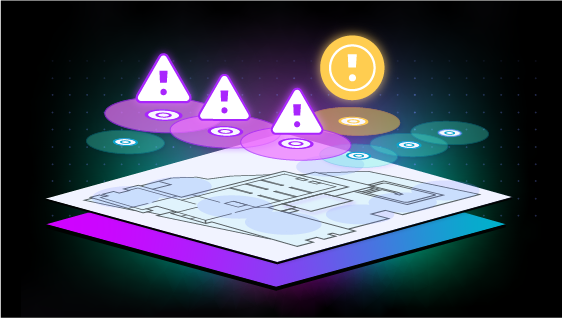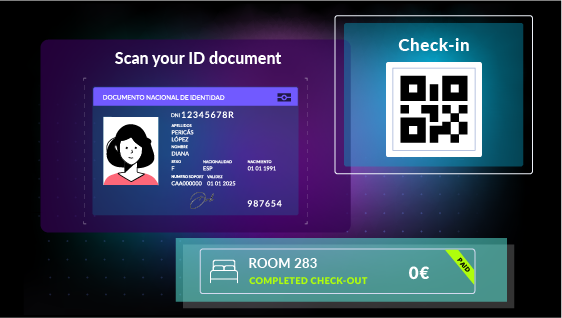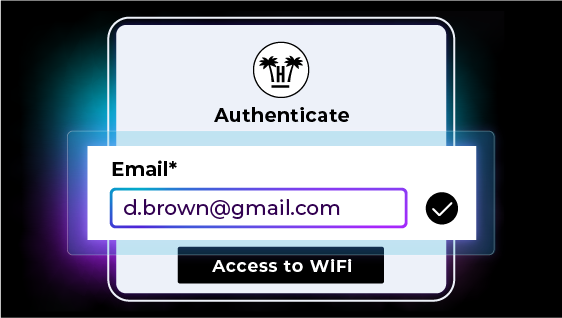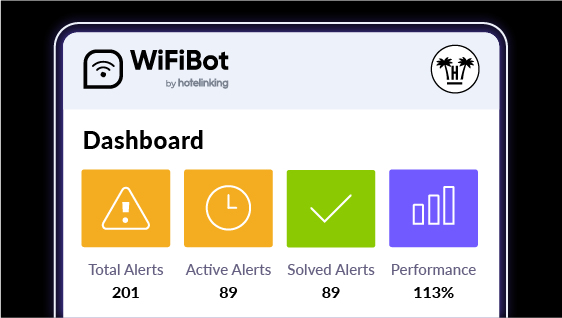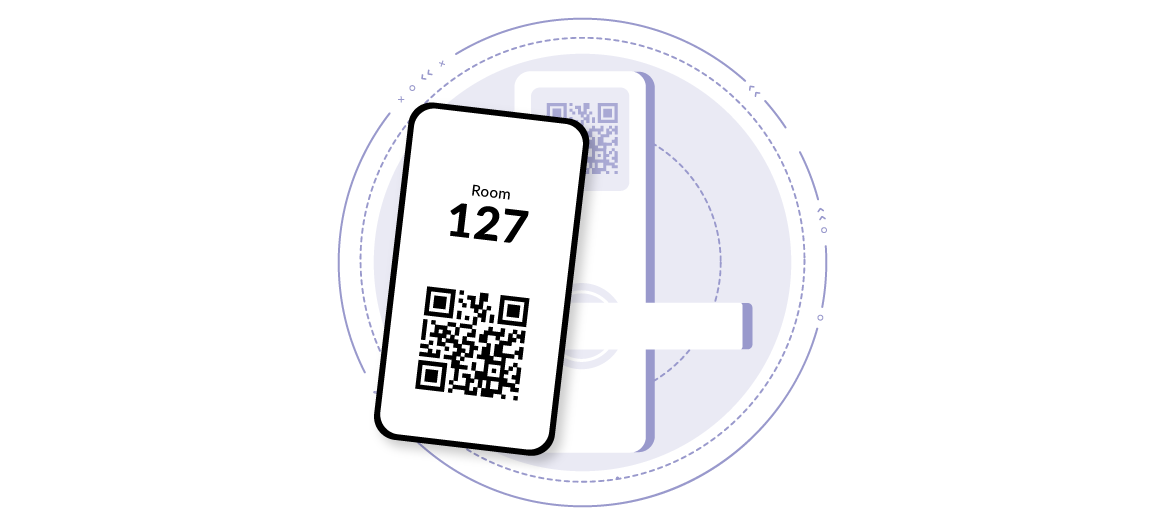
Contactless technology for hotels: everything you need to digitise your property.
Contactless solutions are an added value and a great opportunity to stand out since they have a lot to offer both to businesses and their customers.
The Covid-19 pandemic has accelerated the digital transformation process in which the tourism sector was immersed. A development that is perceived especially when it comes to the customer experience.
Until now, technology had focused on the pre-journey stage, that is, on the search, comparison and purchase. Now, however, the crisis has activated digitalisation in an incredible way beyond the transaction: the enjoyment of the trip.
In the hotel industry, accommodations have been forced to reinvent themselves and digitise processes to avoid physical contact in order to offer maximum safety to their customers and employees. For example, we have seen that many have implemented solutions such as guest apps, online check-in, electronic locks, digital signage, QR codes, etc., and a wide range of technological tools.
In the long term, digitalisation will be even more relevant because it will allow hotel companies to offer a level of service that meets the expectations of the customer, who is used to digital consumption and the use of technologies and applications.
In addition, it will allow to operate more efficiently by automating and digitising many of the processes that were previously done manually and at a higher cost. All this will ultimately translate into savings for businesses and increased customer satisfaction.
With this we see that technology is not only a plus to the offer of a hotel, it is an essential component for the future of this industry and contactless technological solutions are at the core of this digitalisation process.
Contactless technology and its advantages
Contactless technology consists of establishing a wireless communication connection between several electronic devices that are a few centimetres away and without physical contact between them.
This offers a wide range of utilities for companies and users, such as card payments in retail outlets or access to hotel rooms using digital keys.
Given its usefulness and that it allows less contact, this technology has become the great ally of tourism in this new normal we mentioned before; but it is not the only reason why this trend is so popular, since it has much to offer in the future for both companies and their customers. For example, it allows you to connect with customers on the devices and channels where they spend most of their time and create new ways to communicate with and serve them.
Companies that use these solutions obtain the following advantages:
- maintain a safe distance between employees and customers
- facilitate the daily tasks of the staff
- reduce waiting times at the reception
- facilitate communication with staff
- have real-time management statistics and analysis
- simplify processes (reservations, check-ins, room orders, etc.)
- greater savings
- service personalisation
- a competitive advantage
- transparent documentation of processes without losing any information
- efficient cooperation between departments
In short, contactless solutions are an added value and a great opportunity to stand out. Not only do they offer hotels new ways to interact with their guests, but they also drive operational efficiency and enable a customer-centric service.
Which contactless technologies are essential in a hotel?
To create a true contactless experience, it’s important to understand each phase of the guest journey to decide at what stage manual operations can be replaced by technology that helps automate daily staff tasks and improve customer service.
It should be said that, ideally, we should be able to combine digital facilities with the services provided by the staff since, after all, human contact is a key value in hospitality.
Some of the solutions presents on the market are:
- Digital check-in and check-out
- Captive WiFi Portal
- Online satisfaction surveys
- Digital loyalty programmes
- Automatic WiFi monitoring and control
Digital check-in and check-out
Online check-in is an alternative both to simplify the guests’ check in process and to increase the front desk’s productivity. In this case, it is not the receptionist butguests themselves who complete the check-in form (name, ID, reservation details, mainly) from a website or online application through any device before arrival at the hotel.
Once at the property, guests only have to worry about identifying themselves, if they have not done so previously by providing their personal documentation, and collecting their room key. There are more sophisticated systems that allow you to choose the room in advance and even receive the key on your mobile using a code.
The online check-in adds great benefits to the operation of a hotel. To begin with, it prevents crowds from gathering and speeds up the reception work by reducing waiting queues. If you have a system integrated with the PMS, it is possible to create more detailed customer profiles and increase the knowledge about them. Also, the hotel’s check-in system can act as a new sales channel, favouring upselling and cross-selling: the check-in is an excellent opportunity to start establishing a direct relationship with guests and suggest upsellings such as a superior room or a spa treatment.
At Hotelinking we have developed Autocheckin, an online check-in system that, in addition to being integrated with the main hotel management solutions on the market, allows any guest to check in regardless of the channel through which they have made the reservation (direct, OTA or TT. OO.).
Now, it is the time to consider a change in the check-in process and commit to this technology to ensure a satisfactory guest experience. We explain all its benefits and operation in this article: 5 reasons to offer online check in to your hotel guests.
Captive WiFi Portal for digital collection of guest data
Captive WiFi Portal is the guest data collection system through the WiFi connection. It works when a guest wants to access the internet, searches for the WiFi network, selects it and connects through a form. It allows hotel properties to collect quality data, verified and in compliance with the GDPR.
This information can be further enriched if it is implemented with the PMS data to have more detailed customer profiles that allow greater awareness of the target audience. An information that contributes to develop marketing and loyalty campaigns with more precise and, therefore, more effective segmentations, capable of not only attracting new customers, but also diverting reservations from commissioned channels to the direct channel of those repeat customers.
In addition, some Captive WiFi Portal tools have the possibility of sending automated communications to encourage engagement with the hotel brand, such as welcome gifts or rewards for repeating a stay, so you get closer to the guest without being invasive and can personalise the service more hence improving the quality of the experience in the hotel.
Read this article to learn about everything that a Captive WiFi Portal system can bring to your hotel: What does Captive WiFi Portal mean to the hotel industry?
Online satisfaction surveys
The best way to know if guests are satisfied is by asking them directly. It is an important exercise because their feedback will help improve the quality of services.
Surveys help to more accurately identify the areas of improvement and those that customers value most to enhance them. Besides, it must be considered that a satisfied customer can repeat their stay and / or recommend your property to other potential guests, acting as a brand ambassador.
The most practical and effective format is to send the survey via email taking advantage of the personal data provided by guests. In this way, the participation and quality of the answers increases drastically since the guest can choose the time and place to answer. Other advantages are the saving of time and the simplification of results management by collecting information already digitised.
We know that guest reviews can make all the difference for a hotel. However, reputation management is usually seen from a consecutive perspective, that is, it tries to solve customer dissatisfaction once the comments and ratings are already published.
If preventive measures are implemented to anticipate negative reviews, it is possible to reduce their impact on opinion portals. To do this, satisfaction surveys during the stay make it possible to detect dissatisfied guests when they are still in the hotel and thus be able to react in time, solving any uncomfortable situation.
In this way, unfair reviews and negative opinions can be stopped and even become positive because, when an undesired situation is solved quickly a guest is doubly satisfied. This in turn will influence the quality of the comments they can make on the opinion portals and, finally, the position in the ranking.
In this article we give you all the keys to improve the position of your property in the online reputation rankings: Analysing Tripadvisor: how to improve reputation and visibility in the ranking
Digital Loyalty Programme
Loyalty programmes have been part of the hotel industry strategy for a long time because they are essential to increase repetition and disintermediate reservations, in addition to reducing the cost of customer acquisition.
However, some programmes are unattractive because they do not generate any value for the customer. Traditional loyalty cards, points or discounts are falling into disuse because now travellers are looking for more personalised advantages and programmes that are practical, with achievable and easy to understand benefits.
Now, thanks to new technologies, creating a system that fosters loyalty and rewards guests is within the reach of any hotel property, both large hotel chains and independent hotels. You can create simple programmes without making a large investment with tangible results from the moment they are implemented.
There are several tools that facilitate the implementation of loyalty programmes that can help achieve that goal. For example, you can create an automated programme through WiFi in a few minutes and 100 % digital.
When the customer connects to the hotel’s WiFi, the system saves the MAC address of each device they connect to. In this way, when you repeat your stay, the system recognises you without the need to request the data again, welcomes you to the hotel and sends you an automated email with your reward. The rewards are previously configured by the property (depending on the number of stays, for example), they are adjusted to the customer’s profile and can be promocodes or gifts to be redeemed during or after the stay.
Another advantage of a digital loyalty programme is that it stores all the information, creating statistics that allow us to know the evolution and success of the rewards and data such as the percentage of repeat guests, the nationalities and ages most prone to loyalty, etc. Subsequently, using a CRM it will be possible to take advantage of this information to send more segmented and personalised campaigns.
Find out which tools are essential to take advantage of this information and create and enhance loyalty campaigns: Marketing tools to make your hotel customers loyal.
Automatic WiFi monitoring and control
One of the services that guests value the most is WiFi. Therefore, its proper functioning today is essential since they perceive it as an essential service during their holidays and its malfunction can cause complaints and damage the brand image.
An important aspect to always offer a good connection is to perform an audit, that is, to fully review the system (routers, switches, access points, firewalls, servers …) to know their status and see what adjustments or changes are necessary, as well as analyse and detect deficiencies in the performance, capacity and coverage of the wireless signal.
However, despite an optimal set up and status of the components, there may still be some one-off network failures. In these cases, when a guest cannot access the internet or the connection is very slow, they usually ask the hotel staff for help. In most cases, these incidences can be resolved on the spot and without the intervention of other people.
For these cases, we have developed a system called WiFiBot that automatically solves these internet connection problems without the need for staff to intervene, essential to offer a satisfactory experience, up to the expectations of the guest.
We explain how WiFiBot works and its main benefits for a hotel in this article: How to monitor the performance and troubleshoot hotel’s WiFi network issues automatically.
Tips
Taking advantage of new technologies to adapt to the guidelines demanded by the current health crisis and changes in customer behaviour is essential. In the long term, it will be even more relevant, with guests becoming more and more digitally savvy. So hotels that focus their efforts on completely digitising their processes to offer more efficient and comfortable experiences can gain a strong competitive advantage.
However, implementing contactless technology in a hotel can involve profound changes that result in staff training, the adoption of new safety measures and even in the change of the entire structure of an organisation.
To deliver true added value, technology solutions must be tailored to the unique needs of each company and seamlessly integrated with existing infrastructures and software. Having a trusted technology partner, who is a specialist in cutting-edge solutions for hotels and an expert in integrations, plays a decisive role in making the digitalisation project a success.
At Hotelinking, we develop innovative solutions and approaches so that hotel companies can transform their business. If you are considering implementing contactless services in your property, do not hesitate to contact us.
